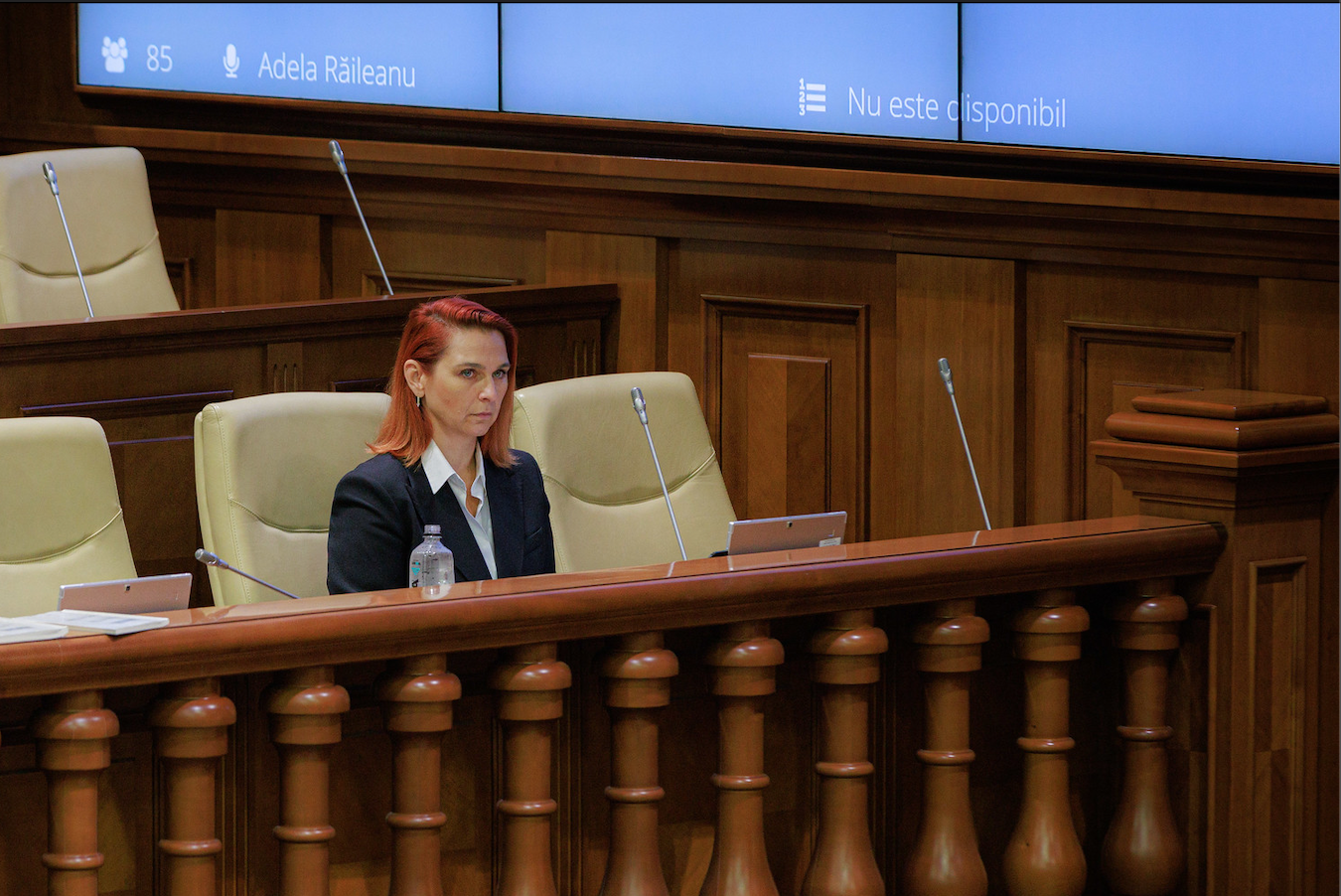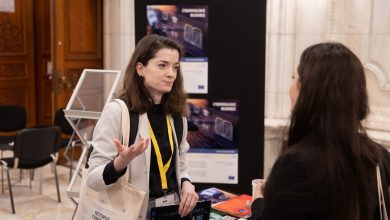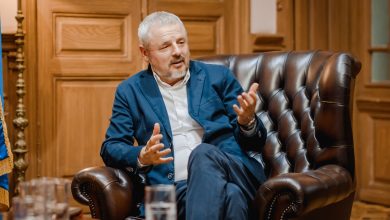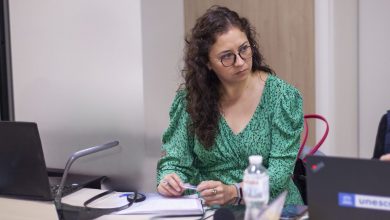Ana Revenco: “The Center’s Main Tool Will Be Resilience Due to Information, Awareness, and Education”

More than a month after her appointment as director of the Center for Strategic Communications and Combating Disinformation, Ana Revenco provides details regarding the stages of creating the new institution in an interview for Media Azi. According to her, “via information and communication by all the methods and at all the levels, we intend to counter the dangers of disinformation, and the Center’s main tool will be resilience due to information, awareness, and education.”
Media Azi: The Center for Strategic Communications and Combating Disinformation was established by the legislation on July 31, and, on October 19, you were appointed its director. At which stage are the things currently?
Ana Revenco: Since my appointment as director of the Center for Strategic Communications and Combating Disinformation, submitting the Concept of strategic communication and countering disinformation, information manipulation activities, and foreign interference for 2024-2028 and the Structure of the Center for Strategic Communications and Combating Disinformation to the Parliament for approval as soon as possible has been the priority. These two documents are currently being discussed with the relevant parliamentary committees.
The strategic communication concept establishes the limits and directions of the Center’s activity which is particularly focused on creating the mechanisms primarily enabling citizens to navigate the informational environment, to identify the risks of disinformation, and to have a critical attitude towards information. Another clearly defined objective within the concept is related to improving the state institutions’ capacity to communicate more efficiently, so that a citizen has all the reliable data and information to balance. In addition, the Concept specifies the thematic areas which reflect the national security interests or objectives the Center’s strategic communication is focused upon, and, respectively, they are protected against disinformation. It refers to joining the European Union, social cohesion, economic resilience, consolidating the defense sector, and improving the national security in the changing regional context.
This concept was developed with the contribution of the civil society organizations, media NGOs, and also complies with the good practices in the EU member states. As to the Center’s structure, it is designed to provide optimal efficiency in fulfilling its functions stipulated by the law and will have a team of 35 specialists.
Both documents are currently at the stage of approval by the Parliament. Once they are approved, we will be able to go on with the procedure of drafting the internal documents and creating the team, as well as developing the action plan which will stipulate the priorities for the next year.
Is it true that Rosian Vasiloi, the current head of the Border Police, will be deputy head of the Center?
According to the legislation, the Center shall have a deputy head appointed by a presidential decree upon suggestion of the institution’s director. I have not identified any person for this purpose yet. As I have mentioned earlier, our priority was to manage drafting the Concept of strategic communication and the Center’s structure on time.
As to Rosian Vasiloi, this is a fake which was spread as a news item, but this information has not been verified. It was a fake which was launched in the public space and spread further, an example of disinformation, because this information was shared without any verification. We are currently focused on the center’s structure, and, in general, we are not hiring any staff at the moment. We still have not reached the recruitment or staff selection stage. Our priority, immediately after the appointment, was drafting the two documents and sending them to the Parliament before the deadlines.
What follows after the two documents are approved by the deputies?
Once the structure is approved, we will proceed to drafting the internal acts regulating the activities and, accordingly, to creating the team – the public announcements regarding selection and recruitment. After the Concept is approved, we will initiate drafting an action plan which will stipulate the priorities for the next year. We would like it to be a plan which reflects the principle of an integrated approach and co-participation – jointly with the state institutions and civil society communities – to take part in anti-disinformation and strategic communication efforts. We mean the academic environment, the media, civil society, and the media industry – their knowledge, expertise, and tools have already brought essential contributions. The Center is not intended to replace the initiatives which already exist; it is supposed to make them even more valuable. The Center will provide a common platform and agenda, and encourage sharing information, experiences, and good practices in building individual and community resilience for countering disinformation.
We will keep moving further quite dynamically. We intend to get all the necessary documents in order to initiate the recruitment process already in the first quarter of 2024 and to have at least the core team created.
How can the Center help people counter disinformation?
The center will be warning the population, civil society, and state institutions. The Center’s analysts, using OSINT-type tools and methods, i.e. analyzing information from open sources, will be monitoring and detecting whether unreliable information related to one of the five thematic pillars is circulating in the public space. After that, via public activities and campaigns, the Center and its partners will be proactively disproving a large share of disinformation and manipulation, and when citizens come across false information next time, they will ignore it or report it as fake and unreliable in the public space. All of these activities will help other citizens to be correctly informed.
Another key aspect will be supporting and enhancing media education and digital literacy initiatives. These efforts will result in improving citizens’ ability to tell reliable information from fake or manipulative information. The Center suggests developing partnerships with large technological platforms in order to increase the efforts for detecting fakes and limiting their circulation, including on the social networks. In this way, we will contribute to creating a healthier informational environment for the citizens.
We will be implementing instructive programs for functionaries to enhance the capacities for strategic communication and countering disinformation.
The truth is that the Republic of Moldova and its citizens are targets of disinformation which aims to cause polarization and hatred, induce fear and lack of trust in the state institutions, and decrease citizens’ ability to make choices by thinking freely without any abuse or pressure. When we are surrounded by fake news and informational manipulation, we are excluded from the real context and discussions regarding our life and safety, we become isolated from the persons around us and the events actually happening next to us. Disinformation makes us deviate from reality, and we make decisions which are not in our favor. All the countries which appreciate such values as democracy, security, and citizens’ prosperity share such priorities as countering disinformation and implementing strategic information activities. The Republic of Moldova has adopted these standards and best practices.
The Center intends to create a robust and resilient information environment based on true information and contexts. It will help the state institutions communicate efficiently and react to disinformation promptly, and citizens will be able to tell true information from fakes and to use information critically.
What did you personally suggest doing when you accepted this function?
This is an opportunity and the way I could serve my country and protect it, because this is my country. I would like to serve the country using my knowledge. Protecting implies helping create, developing the conditions for the country to make it prosperous. But the country basically implies all the citizens who are happy to reside here, who feel safe, and live with the feelings of safety and pride. If these aspects are endangered, it is the way I can contribute to eliminating this danger, diminishing it, because this is a hindrance to our country’s development and progress. I learned this attitude in the family: you have to be worthy of your country. First and foremost, it means being with the people, with the citizens, because this institution should serve the people of the Republic of Moldova.




